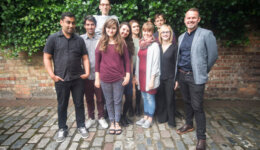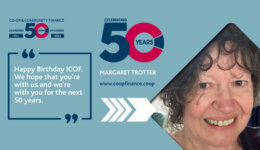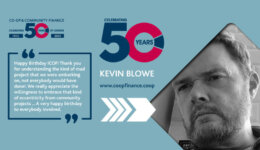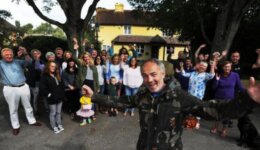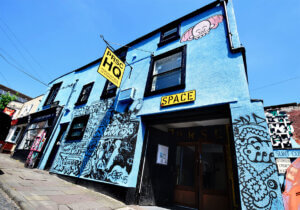As we head towards the end of our fiftieth year, we’re interviewing some of our more recent borrowers. Today we’re talking to Kevin Blowe, one of the founding members of Clapton Community Football Club. Kevin was heavily involved in negotiating the purchase of the Old Spotted Dog ground in 2020.
“We were in the process of trying to negotiate a lease of the football ground and surrounds with the brewery owners. This was in the middle of COVID and after some considerable months, they just said, ‘Do you want to buy it?’. And we said yes! That was going to be a much better idea than getting a lease. So pretty quickly, the question came up – what are we going to do next? How are we going to do this? I remember opening the gates when we first got the keys and the grass was up to my shoulders, there was rubbish everywhere. We subsequently discovered that the clubhouse roof needed replacing too.
We spent some time talking to the mainstream banks, including our own and they just weren’t interested. They didn’t understand the structure of our organisation, they didn’t understand what a community benefit society was. They didn’t understand why it was being offered at the price it was. They didn’t understand anything at all about the process and they just weren’t willing to entertain any risk as – although we had assets – we knew that it was going to be expensive to do the place up because the site been derelict for a year.
It was at that point that I spoke to somebody within the co-operative network, who was a football fan. And I’d say that half the people involved in co-operative movements are football fans of one kind or another. They referred us to Ian Rothwell, who was then the Investments Manager at ICOF, who is also a massive football fan and he said, ‘Let’s just meet’ and so that’s what happened.
We didn’t need to explain the nature or the structure of our organisation. We didn’t need to explain why it was important, because he just got that already. So then it came down to asking if we had the resources to be able to manage a loan, could we make a business case for it? But it wasn’t the kind of horrible commercial business case because there was a real understanding that so much of this was driven by passion as much as anything else, rather than just money. We knew we would get hundreds of people coming to our games once we got the ground back but it’s quite difficult to explain that. So there’s a little bit of a leap of faith there that requires a lender to understand that this was something more than just an investment for its own. For us. It was a passion project.
We also had an opportunity to purchase the warehouse that’s next door to the ground, which was incredibly important to us because it meant that we could, in the longer term, help to create a community space, a community centre, that was part of the footprint of the area. Obviously, that’s going to take many more years. That was a purchase from the insolvency service and everything needed to be done at the last minute, but because we already had an existing relationship with ICOF we didn’t have to sell the case – we’d already had a couple of years of proving that we could manage the loan, and so that relationship has extended. It was a relief not to have to go through the drama of looking for the first loan again. We’ve now got four separate loans with ICOF, over a longer period than they originally were, which is fine.
We started playing football at the ground with a couple of friendly games in July of 2022, just two years after we bought the ground. One of those early games was the Women’s team against AFC Wimbledon’s women’s team who are – it has to be said – considerably better than us! We got thrashed, but it was a lovely day, and from then on women’s games were taking place at the ground. The men weren’t able to come back and play until we got our change rooms fixed. We’ve had some incredible games – including against FC St Pauli women’s team which was the first international game at that ground since the 1920s. That was brilliant, there was an enormous crowd of over 1000 people there for that game. And then we played against FC United of Manchester, who were the the fans breakaway team – we had over 1000 for that as well. That was our first showpiece men’s game.
There’s been a real growth in our activities. But the big thing has been making sure that we’ve got a base. It’s totally transformed everything. People say we can’t believe how different it is from when we came here 10 years ago. The clubhouse has got a new roof and it’s welcoming, it’s got a bar that works properly, it’s got a beautiful pitch. All looked after by volunteers. And that can only continue to develop us – we’ve got big plans.
Right now, we’re back in the Old Spotted Dog ground and both of our teams are now playing regularly there. Since 2020 when we first established a relationship with ICOF we’ve gone from having a derelict ground and one team to a functioning ground and seven teams! It’s been incredibly quick but we’re in this for the long haul. I think by the time we have actually paid off our loan, I’ll be in my mid 80s! We’ve got Men’s and Women’s first and reserve teams, and then we’ve got open access teams for women and non binary people who are returning to football, maybe not having played since they were a school. We’ve got an under 13 team, they play on Hackney marshes. We’ve got youth training that’s taking place in three different places in East London.
We’ve got fully functioning changing rooms, brand new spotlights as the 2nd of October 2023. We had a game the very next night, the first floodlit game that we’ve had since we took over because the old lights were awful. We’re focusing on building a space both for football training, but also as a community space and as an organising space. There are lots of people who don’t have somewhere to base themselves – we’ve done events with people like the London Renters Union, and others, that’s the community benefit element of what we do. And we’ve been really fortunate because we are still getting significant grants. We have the largest crowd in the country for our level on Saturday – we have 500 people attending the game. And loads of those people are buying our merchandise and it’s all part of the mix of being able to soldier on and develop the club with some degree of stability.
One thing we’ve definitely learned is running a football club or running a football ground is horrendously expensive. Even with loads and loads of volunteers, a lot of the stuff we need is specialist and so costs a fair bit. We’ve got big plans and we feel much more in control of the decisions that we need to make because actually what we want to do is just settle down, have the games taking place, organise events in our club house. We want to expand the building that we’re in so that we’ve got more space for community activities – the new space that we’ve got is currently empty and could be useful. But we’re going to take that fairly slowly. The decisions we make now will be on the basis of a timescale that we set, rather than it being because we’ve got to get it done by an external deadline. We’re no longer firefighting another drama which is a relief. We don’t really want to rush into that because it’s one of those situations where we’re going to get one shot at getting proper funding for it. We’re going to spend time talking to local people and groups to understand what they want, need and will use. There’s a real lack of places to meet, particularly for projects involving young people, and I think that’s probably where our focus will lie.
Happy Birthday ICOF! Thank you for understanding the kind of mad project that we were embarking on, not everybody would have done!. We really appreciate the willingness to embrace that kind of eccentricity from community projects because community projects *are* messy and they are difficult. There is a lack of funding out there from people who understand that. A very happy birthday to everybody involved.”

